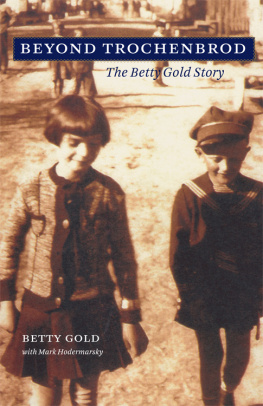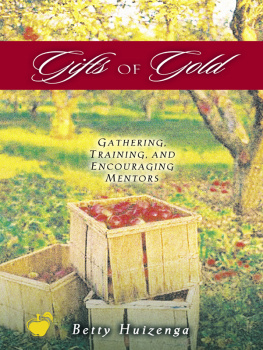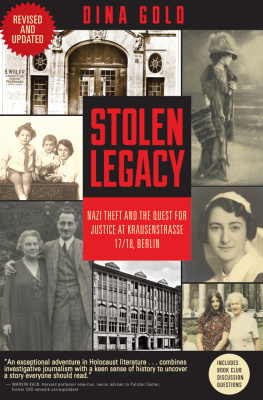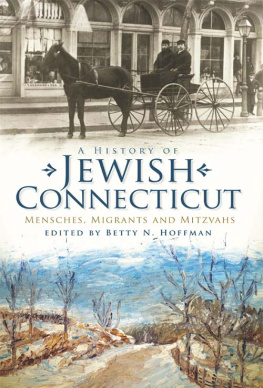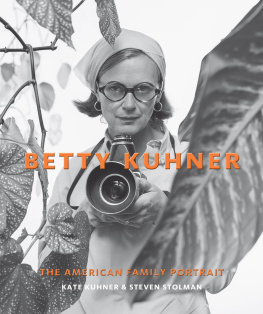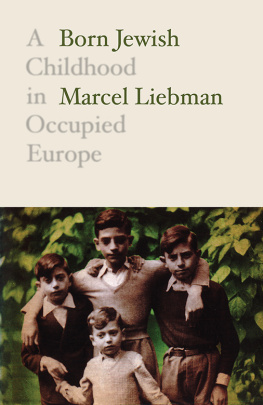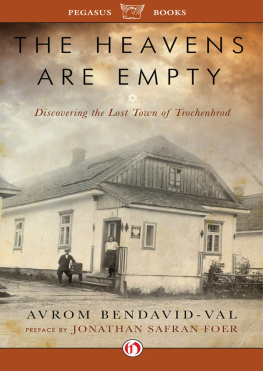Gold, Betty, 1930- author.
Betty Gold with Mark Hodermarsky.
Includes bibliographical references and index.
1. Gold, Betty, 1930 2. JewsUkraineSofivka (Volynska oblast)
Biography. 3. Holocaust, Jewish (19391945)UkraineSofivka
(Volynska oblast)Personal narratives. 4. Holocaust survivors
OhioClevelandBiography. 5. Sofivka (Volynska oblast, Ukraine)
Biography. I. Hodermarsky, Mark, author. II. Title.
The only way to overcome sadness is to consume it.
JONATHAN SAFRAN FOER
(Everything Is Illuminated)
Near Nobel Peace Prize recipient, author, and Holocaust survivor, Elie Wiesel, sat a petite woman whose dark eyes and pensive expression devoured the guest speakers every word. Wiesel, addressing the Saint Ignatius High School student body, was discussing his book Night, a terrifying memoir of his confinement with his father at the Auschwitz and Buchenwald concentration camps in 1944 and 1945. At the time, I knew only her name, Betty Gold, and that she was a local Holocaust survivor. Within a few months, however, Betty and I would be immersed in writing her unforgettable story.
Nancy Wilhelm, a history teacher at Saint Ignatius in Cleveland, had invited Betty to speak to her classes before Wiesels 2007 visit. Having taken students on field trips to the Maltz Museum of Jewish Heritage in Beachwood, a suburb of Cleveland, where Betty then and now serves as a docent, Nancy witnessed Bettys riveting narrative about the tragic events at her home, Trochenbrod, once a prosperous Polish town whose population was 99 percent Jewish. Nancy felt compelled to introduce her to the Saint Ignatius community. Betty would return to the campus regularly, not only to talk to Nancys classes but to others and eventually to mine. It was Nancy who asked me to consider helping Betty put her story into words, the story she had been sharing with so many for so long.
Before committing to the project, I asked Betty to visit one of my English classes, and thats all it took. In my thirty-eight years of teaching, I have never seen a class so transfixed by a guest speaker as on that memorable day. The young men were touched by Bettys dramatic and poignant testimony to the point of tears. I decided, right then and there, that I must help Betty write her story.
And it is Bettys story, her memory of what took place, that Ive attempted to recount from our many interviews over several years. The memoirs tone is conversational rather than scholarly. My goal has been to preserve Bettys distinctive voice, to replicate in print what has enlightened and inspired those who have heard her speak.
It has taken Betty and many Holocaust survivors quite a few years to tell their stories, even to family members. Not until Steven Spielberg founded the Survivors of the Shoah Visual History Foundation was Betty willing to discuss her past. Between 1994 and 1999, Spielbergs foundation conducted thousands of video interviews with Holocaust survivors like Betty Gold. Betty began to describe in depth the Trochenbrod massacre, her harrowing escape from the Nazis, and the subsequent brutal physical and psychological hardships that she and her family endured while hiding in the forest. Increasingly driven to disclose the atrocities that were committed against her beloved townspeople, Betty, in 2005, accepted the chance to volunteer as a docent at the Maltz Museum. The popularity of Bettys absorbing talks eventually led to speaking engagements at high schools, colleges, and organizations.
Recently, Avrom Bendavid-Val authored a book on Trochenbrod, The Heavens Are Empty; Jeremy Goldsheider produced a film documentary on Trochenbrod, Lost Town; and Everything Is Illuminated by Jonathan Safran Foer became a critically acclaimed fictional account of Trochenbrod that was also made into a popular movie. All three men have relied on Betty Gold for their projects, and she has been extraordinarily pleased by the results. As the only living survivor of the Trochenbrod tragedy, her vocation has been to ensure that the world does not forget the evil that was inflicted upon her Polish town, now a barren stretch of land in Ukraine that she has visited on three occasions. As Betty has expressed on countless occasions, We must educate, learn, and never forget the atrocities of the Holocaust. It is the only way to prevent it from happening again. This has been her mission statement.
Among many unforgettable features of Bettys narrative is the courage she demonstrated as a child, including her willingness to scavenge alone for food at night at enormous risk to herself and her family. That a twelve-year-old girl was given such immense responsibility for the groups survival is remarkable. Added to these gripping childhood experiences are her details regarding the challenges that awaited her upon her arrival to America in 1946, especially the prejudices she faced as a Jewish immigrant and as a woman. Later, she shares the heartrending events of a broken marriage, surviving cancer, and losing two adult sons, one by suicide.
Though Betty might be expected to feel bitterness and anger, she has displayed instead perseverance, wisdom, and compassion. She has gone beyond her experiences in Trochenbrod to transform hearts and minds. Betty Gold has embraced life, both the good and bad it offers all of us.
Nothing remains of Trochenbrod. A prosperous Polish town of five thousand exists only in memory. The shopkeepers, craftspeople, teachers, factory workers, and farmers are all silent. Synagogues, Hebrew school, leather factories, and retail shops have been replaced by a tractor trail, barren fields, and scattered stones. In fact, the former town no longer belongs to eastern Poland; it is now part of northwestern Ukraine, near Lutsk.
Trochenbrod, the Yiddish name for a Russian town called Sofiyovka in Ukrainian and Zofiowka in Polish, was founded in 1835 as a Jewish settlement. Legend has it that it was named after the first two Jews to live in the town: Trochaen and Brod. The Polish names derive from Sofia, a Russian princess who donated land for the settlement. To avoid oppressive anti-Jewish laws in Tsarist Russia, including having sons serve in the Russian army until the age of forty-five, Jews poured into Trochenbrod, making it the only all-Jewish town to exist outside biblical Israel. Eventually, Jews would make up 99 percent of the population.
Following the First World War, the town fell from Russian hands into Polish control, and Trochenbrod thrived. Eli Potash, Betty Golds father, became a successful proprietor of a leatherworking shop, supplying the townspeople and peasants with shoes, boots, and saddles. Eli and Riva Potash, along with their three children, lived comfortably in a six-room house. Except for a few instances of anti-Semitism, Betty Potash Gold, through age nine, enjoyed a happy childhood, surrounded by a loving and large extended family. The serenity, however, was about to endswiftly and horrifically.

